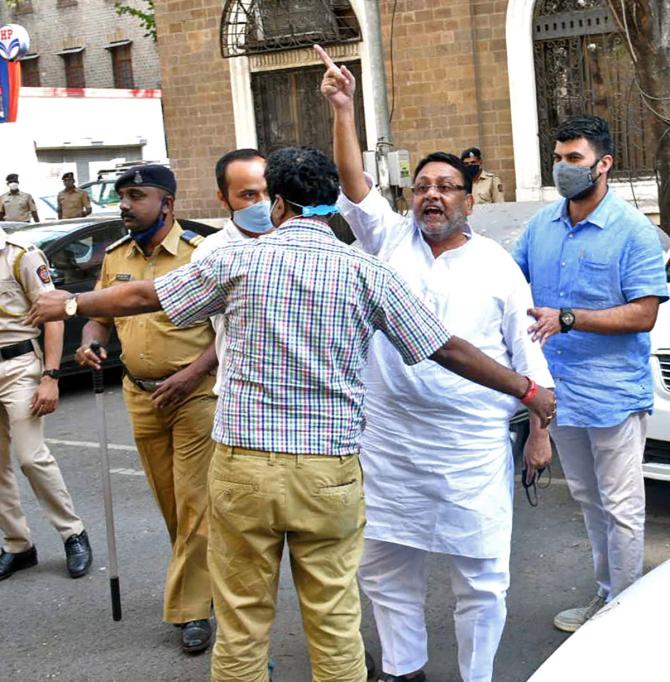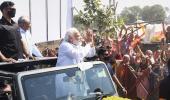'Whatever ED officers do -- issue summons, conduct searches or arrest a person -- they have to face the courts.'

Rajeshwar Singh, the newly elected MLA from Lucknow's Sarojini Nagar constituency, served ten years in the UP police and 13 years with the Enforcement Directorate where he investigated several high-profile controversial cases, including the Commonwealth Games, 2G Spectrum, Aircel-Maxis etc.
He sought voluntary retirement with 12 years of service left and joined the Bharatiya Janata Party just before the 2022 assembly election, winning his seat with a record margin.
Hailing from a family of bureaucrats -- his father was a gallantry award winning police officer; his wife Laxmi Singh, an IPS officer, is an inspector general of police posted in Lucknow; elder sister Abha Singh is a former Indian Postal Service officer and now a well known lawyer in Mumbai; brother-in-law Y P Singh is a former IPS officer and crusader against corruption; another brother-in-law Rajeev Krishna, IPS, is an additional director general of police posted in Agra while a niece Isha Singh is an IPS probationer.
In a telephone interview with Rediff.com's Archana Masih, Rajeshwar Singh dismisses the Opposition's accusation that the Enforcement Directorate is a handmaiden of the government, speaks about making his constituency into a role model, and points out why the BJP is a party for everyone.
The concluding segment of a two-part interview:
I have to ask you this question because of your long stint in the Enforcement Directorate. There is this controversy about the ED's role in conducting investigations, especially against Maharashtra politicians who have accused ED of being an arm of the government.
The role of the Opposition is to accuse agencies and the government. When they were in power, they were not bothered and did not accuse ED. Now when they are on the other side and committing crimes, they are accusing the ED.
Secondly, the ED's actions are under the purview of the Central Vigilance Commission and the courts of India.
Whatever ED officers do -- issue summons, conduct searches or arrest a person -- they have to face the courts. They have to submit all the reports to the courts and their work is monitored by the courts.
It is wrong to allege that the ED is politically motivated.
Can you give readers an idea about how the ED goes about conducting an investigation? How is ED's attention drawn to financial foul play?
There is a financial intelligence unit of India which provides information to ED. As per the Prevention of Money Laundering Act, all the agencies where predicate offences are committed have to provide the copy of FIRs, then we analyse the cases as per the gravity and as per laid down procedures. The cases are selected and then investigated by ED.
Money laundering threatens the economy of the country. It is a transnational crime and a very serious offence.
Another thing I wanted to ask you is about encounter killings...
An encounter happens when a police party is attacked by criminals. The police has to fire in self defence. It is not as if trigger happy cops are going and killing people. It is not like how the media projects it or the way it is projected.
You simply can't shoot a criminal. Even a criminal has to be given a chance. You ask him to surrender, but when you chase him and he opens fire indiscriminately, then the police have to fire in self defence and to ensure the safety of the public.

An accusation hurled against the BJP is about alienating minorities...
No, no, no. Our schemes are for everyone. For example, 37% beneficiaries of the Ujwala Yojana are minority.
38% beneficiaries of the PM Awas Yojana are minorities... in all the schemes, there are a great number of minority beneficiaries.
Scholarships for the minorities in UP has gone up to Rs 1,000 crores (Rs 10 billion). Earlier, the government had not even distributed the Rs 300 crores (Rs 3 billion) for minority scholarships.
The madarsa board is being set up to provide modern education, computer education. We want that every child should get an opportunity to study science, maths and grow irrespective of religion.
It is the local regional parties that have created this environment because of their vote bank politics.
The BJP is about Sabka Saath Sabka Vikas.
How are you building your relationship with the minority in your own constituency?
I am taking along everybody. Everybody. People have come to me with their problems and I sort their problems irrespective of religion, irrespective of anything.

Going back to your family's legacy in public service, what did the family have to say when you told them about your decision to join politics?
They supported me although it's a very tough decision to leave such a high profile job with 12 years of career remaining. Especially because politics is filled with uncertainties. You don't know what is going to happen.
Yes, it was a tough decision, but they knew I want to serve the nation. They all helped me.
My eldest sister Abha [Abha Singh, lawyer, activist and former bureaucrat] was camping here in Lucknow to help me. It was due to the support of the family and my friends that I could win with a margin of 57,000 votes in the first election which is unheard of in Sarojini Nagar.
Where do you see yourself in politics, say five years from now?
My first priority is my constituency. I've made a commitment to develop my constituency into a role model -- an ideal constituency.
My first priority is towards my constituency. Other things can wait.
Feature Presentation: Aslam Hunani/Rediff.com










